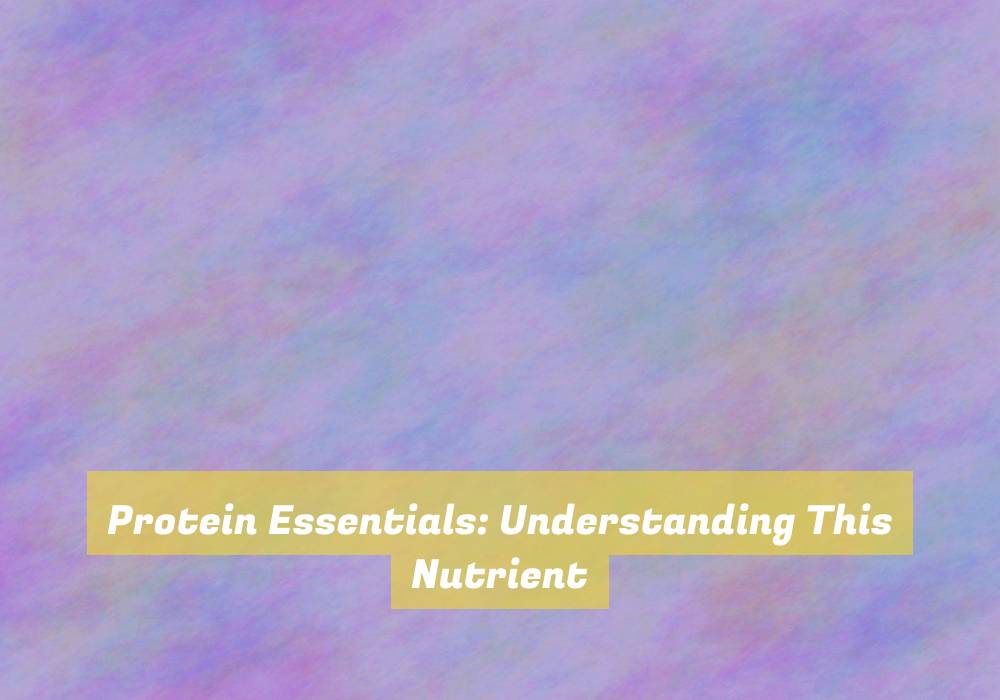Protein Essentials: Understanding This Nutrient
You may think you know everything there is to know about protein, but the truth is, thereG??s a lot more to this nutrient than meets the eye. Understanding the role that protein plays in your overall health is crucial for making informed choices about your diet and lifestyle.
Whether youG??re an athlete looking to optimize performance or someone simply aiming to maintain a balanced diet, the importance of protein cannot be overstated. So, what exactly makes protein so essential, and how can you ensure youG??re getting enough of it?
Stay tuned to uncover the answers to these questions and more.
The Importance of Protein
Understanding the importance of protein is essential for maintaining a healthy and balanced diet. Protein is a crucial macronutrient that plays a vital role in various bodily functions. ItG??s the building block of muscles, skin, and bones, and is also essential for the production of enzymes and hormones. Including an adequate amount of protein in your diet helps in repairing and building tissues, as well as supporting a healthy immune system.
Moreover, protein plays a significant role in weight management. It helps you feel full and satisfied after meals, which can prevent overeating and support weight loss or maintenance. Additionally, protein has a high thermic effect, meaning it requires more energy to digest compared to fats or carbohydrates, further supporting weight management efforts.
Furthermore, protein is essential for preserving muscle mass, especially as you age. Consuming enough protein can help prevent muscle loss and maintain strength and function, contributing to overall health and quality of life.
Therefore, understanding the importance of protein and ensuring an adequate intake is crucial for your overall well-being.
Functions of Protein in the Body
Protein not only serves as the building block for muscles, skin, and bones, but it also performs various essential functions in the body.
Firstly, it plays a crucial role in the growth and repair of tissues. When you engage in physical activities or experience injuries, protein aids in the reconstruction of damaged muscles and tissues, facilitating recovery and promoting overall strength.
Additionally, proteins act as enzymes, which are vital for catalyzing biochemical reactions in the body. These reactions are essential for processes such as digestion, metabolism, and the production of energy.
Moreover, proteins are integral components of hormones, helping to regulate various bodily functions such as growth, metabolism, and reproduction. They also contribute to the immune system by forming antibodies that aid in combating infections and diseases.
Furthermore, protein plays a role in maintaining fluid and electrolyte balance, as well as preserving the bodyG??s pH level.
Lastly, proteins can serve as a source of energy when carbohydrates and fats are insufficient, providing fuel for your bodyG??s daily activities.
Understanding these multifaceted functions underscores the significance of incorporating adequate protein into your diet for overall health and well-being.
Dietary Sources of Protein
When considering your dietary intake, itG??s important to prioritize sources of protein that align with your nutritional needs and preferences. Animal-based sources such as lean meats, poultry, fish, and dairy products are rich in complete proteins, containing all essential amino acids crucial for bodily functions. If you follow a plant-based diet or are looking to incorporate more plant sources of protein, options like legumes (lentils, chickpeas, black beans), tofu, tempeh, edamame, quinoa, and seitan can provide ample protein. Nuts and seeds, including almonds, chia seeds, and hemp seeds, are also great sources of protein and healthy fats.
When choosing your protein sources, consider the overall nutrient profile. For example, fatty fish like salmon not only provide high-quality protein but also heart-healthy omega-3 fatty acids. For vegetarians and vegans, combining different plant-based protein sources throughout the day can ensure a complete amino acid profile. Additionally, be mindful of portion sizes and cooking methods to avoid excessive saturated fats and added sugars.
Recommended Protein Intake
To meet your nutritional needs, itG??s important to understand the recommended intake of protein for your daily diet. The Recommended Dietary Allowance (RDA) for protein is 0.8 grams per kilogram of body weight. However, individual protein needs can vary based on factors such as age, sex, activity level, and overall health.
For example, athletes and individuals engaged in intense physical activity may require a higher protein intake to support muscle repair and growth.
As a general guideline, itG??s beneficial to include a source of protein in each meal to help maintain muscle mass, regulate metabolism, and promote satiety. Good sources of protein include lean meats, poultry, fish, eggs, dairy products, legumes, nuts, and seeds.
When planning your meals, aim to incorporate a variety of protein-rich foods to ensure that youG??re obtaining essential amino acids and other nutrients necessary for overall health.
ItG??s worth noting that consuming significantly more protein than your body needs doesnG??t necessarily equate to increased muscle mass or improved health. Therefore, itG??s important to focus on meeting your individual protein requirements rather than simply trying to maximize protein intake.
Consulting with a healthcare professional or a registered dietitian can provide personalized recommendations based on your specific needs and goals.
Conclusion
So, next time youG??re planning your meals, remember that protein is essential for your bodyG??s functions.
Make sure to include a variety of protein sources in your diet to meet your recommended intake. Whether itG??s from animal or plant-based sources, protein plays a crucial role in maintaining your overall health and well-being.
Prioritize this nutrient in your daily meals to support your bodyG??s needs.







